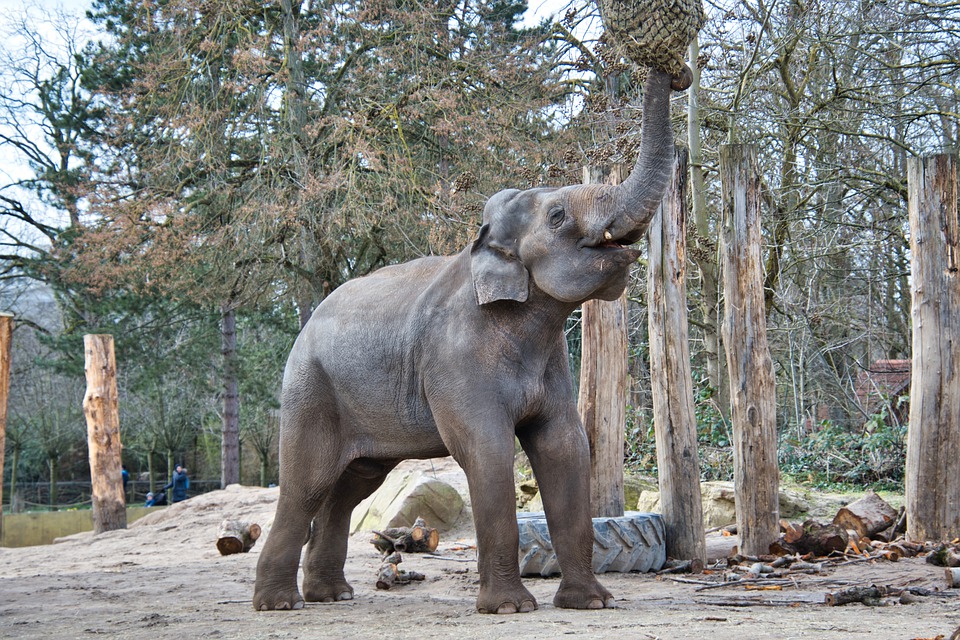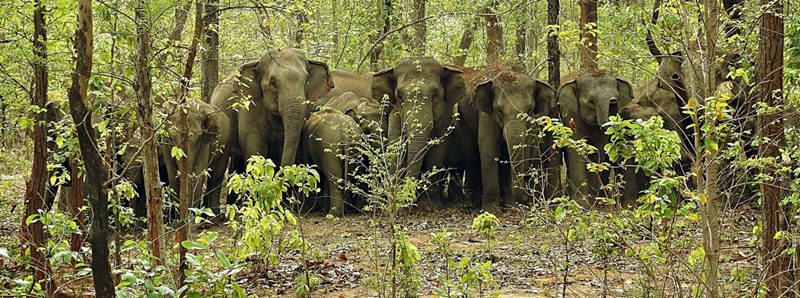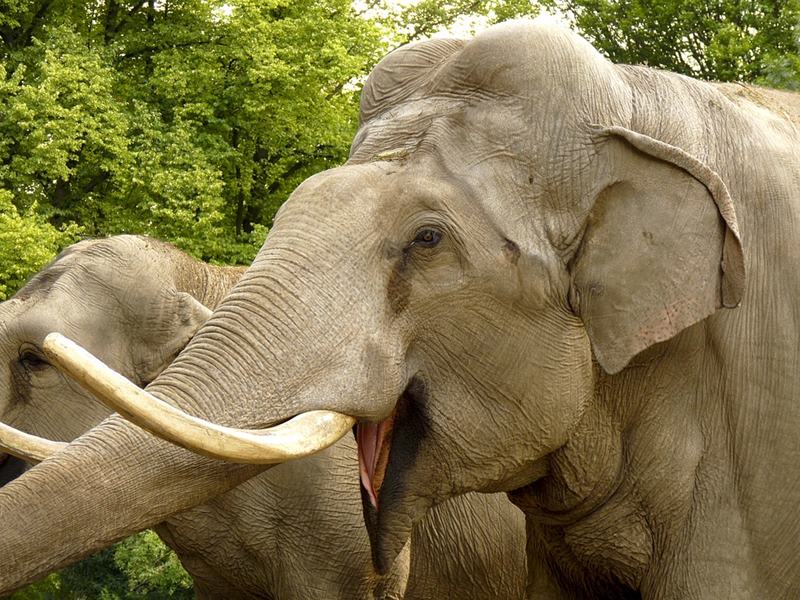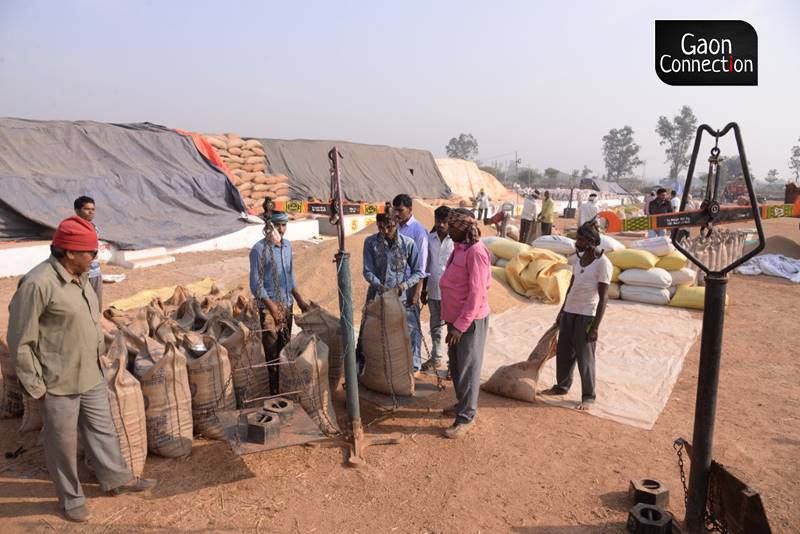To address human-elephant conflict, Chhattisgarh forest dept plans to feed paddy to wild elephants
The Chhattisgarh government has proposed a ‘novel’ initiative to feed wild elephants with all the ‘surplus’ rice it has stored in its godowns, in the hope it will reduce human-elephant encounters. Wildlife experts unhappy at the proposed change in diet.


The forest department believes this initiative will reduce human-elephant conflict. Photo: WWF India
Raipur, Chhattisgarh
Wild elephants in Chhattisgarh can soon look forward to paddy in their diet, says the state forest department, which has come up with a ‘novel’ initiative of feeding paddy to elephants in the state. This, believes the forest department, will reduce human-elephant conflict, as the paddy would be placed outside the villages for the wild elephants to feast upon.
“Making the paddy available to the elephants will prevent them from entering human habitation and ransacking crops and homes in villages,” Mohammad Akbar, forest minister of Chhattisgarh, told Gaon Connection. Since the elephants usually visit the same areas, it will be easy to feed them and keep them happy, he added.
Explaining the paddy diet plan further, the minister said: “In the forest divisions at Surajpur, Dharamjaigarh and Balod, grains were kept out in the open and wild elephants had consumed fourteen quintals of paddy as part of this initiative.”
According to him, the state had as many as 307 wild elephants and human-elephant conflict was a rising concern. “The state government is not so impoverished that it cannot provide food to the wild elephants,” the forest minister Akbar said.
Also Read: Chhattisgarh hopes to end human-wildlife conflict using seedballs of fruit trees
However, this proposal of the state government has not gone down too well with the wildlife experts and environmentalists. Opposition parties have expressed their reservations about this initiative too.
“There is no research to support the theory that elephants will continuously eat paddy,” Meetu Gupta, wildlife expert based in Raipur, told Gaon Connection. “Getting the elephants used to the grains could be dangerous, and according to the Wildlife Protection Act, feeding wild animals this way is a legal offence,” she pointed out. “If there has been studies and research on the matter, then the state government should publish them,” Gupta added.

‘Surplus’ paddy a problem of plenty?
Chhattisgarh is a leading producer of paddy in the country. According to data provided by the state agriculture department, 12.7 million metric tonnes of paddy is grown annually in the state. In the last financial year 2020-21, the state government procured a record 9.2 million metric tonnes of paddy. State government officials complain that millions of rupees worth of grain is lying unused and rotting in the granaries of the state.
There are plans afoot to start production of ethanol from paddy, but that project is yet to see the light of day. The state government has now come up with the idea to feed wild elephants paddy, in the hope it will end human elephant conflict and take care of the ‘surplus’ paddyit has that it is struggling to dispose of.
Also Read: Is the much hyped rice-to-ethanol project in Chhattisgarh running out of fuel?
In order to do so, the forest department is buying paddy in large quantities. According to the state food department, the forest department had asked for the grains and the state cooperative marketing association, Markfed, is supplying them to the forest department at Rs 2,095.83 per quintal.
The state government hopes to address the human-elephant conflict, which has been severe in Sarguja, Raigarh, Korba, Surajpur, Mahasamund, Dhamtari, Gariyaband, Balod, Balrampur and Kaker districts of Chhattisgarh. During the monsoon session of the parliament, the state government revealed that in 2018, 2019 and 2020, elephant human encounters led to the death of 204 people and 45 elephants.
During the same period of three years, there were 66,582 cases of crop damage, 5,047 cases of house damages and 3,151 additional cases of other kinds of damages due to elephant ‘incursions’ into human habitation.

Wildlife experts aghast
Wildlife experts in the state feel that launching this project without any study or research would set a dangerous trend. The main diet of wild elephants is the bark and leaves of trees in the forests, not paddy, the wildlife expert Gupta said.
Also Read: Human-wildlife conflict related killing single biggest threat to wildlife: Report
According to her, elephants enter villages and sometimes pull down houses there, not because they are in search of food, but because the villages lie in their path as these large mammals travel long distances in search of food.
Spreading out grain outside forests will interfere in the food habits of wild animals, Gupta warned. “It may lead to conflict amongst the animals and also, there is the danger of the paddy grains getting infected and spreading disease in the forests,” she added.
The dangers do not end there. Getting the wild elephants habituated to eating paddy is dangerous as now, they will target villages and homes where they can smell the grains, Gupta said “Even transporting paddy from villages will be fraught with danger,” she warned.
Meanwhile, the chief conservator of forests (wildlife) of Chhattisgarh, PV Narasimha Rao, dismissed the need for any scientific study on the diet of elephants. “Is there any necessity for a scientific study to determine what human beings will eat?” he asked Gaon Connection. “And who says paddy is not a part of the elephant’s food habit. It very much is a part of its diet and that is why they are being provided the paddy,” he declared.

Coverup for corruption, alleges opposition
The opposition parties in the state view the paddy diet plan with suspicion, saying it is the ruling party’s way of covering up corruption in its fold. “It is a move to cover up the corruption that has come to light over the procurement of paddy in the state,” Dharamlal Kaushik, opposition leader, told Gaon Connection.
Also Read: Mere outrage will not save the elephants. Protecting forests and working with locals will help
“Using the elephants as an excuse, rotten seeds are being bought from Markfed at a rate much higher than what the state government is auctioning off,” Kaushik alleged. While the government is auctioning the surplus paddy for Rs 1,300-1,400 a quintal, why is the forest department buying it at Rs 2,095.83 a quintal, Kaushik demanded to know.
The stock of the kharif paddy from 2019-20 is spoiled completely and that is what is being touted as the paddy that will be fed to the elephants, said the opposition leader.

What about the Lemru Elephant Reserve?
The state government can show its solidarity with the elephants in other ways, said Kaushik giving the example of the Lemru Elephant Reserve in the Korba district.
Lemru Reserve was set up in order to provide a permanent habitat for wild elephants and reduce human-animal encounters. “If there is any other reason we don’t know of why the state government wants to buy grain to feed the elephants, it should make it public,” the opposition leader concluded.
Also Read: Creating a buzz to tackle an elephantine problem
However, the state forest minister Mohammad Akbar denied all allegations and said that no grain was being bought specially for the elephants. “The grain is just being transferred from one government department to another. Whatever is the need of the forest department for grain will be met and supplied by the food department from its nearest godown,” he clarified. “The government’s money will remain with the government,” he assured.
“There is no problem of any kind and neither should the elephants have any objections to eating paddy,” the forest minister said.


